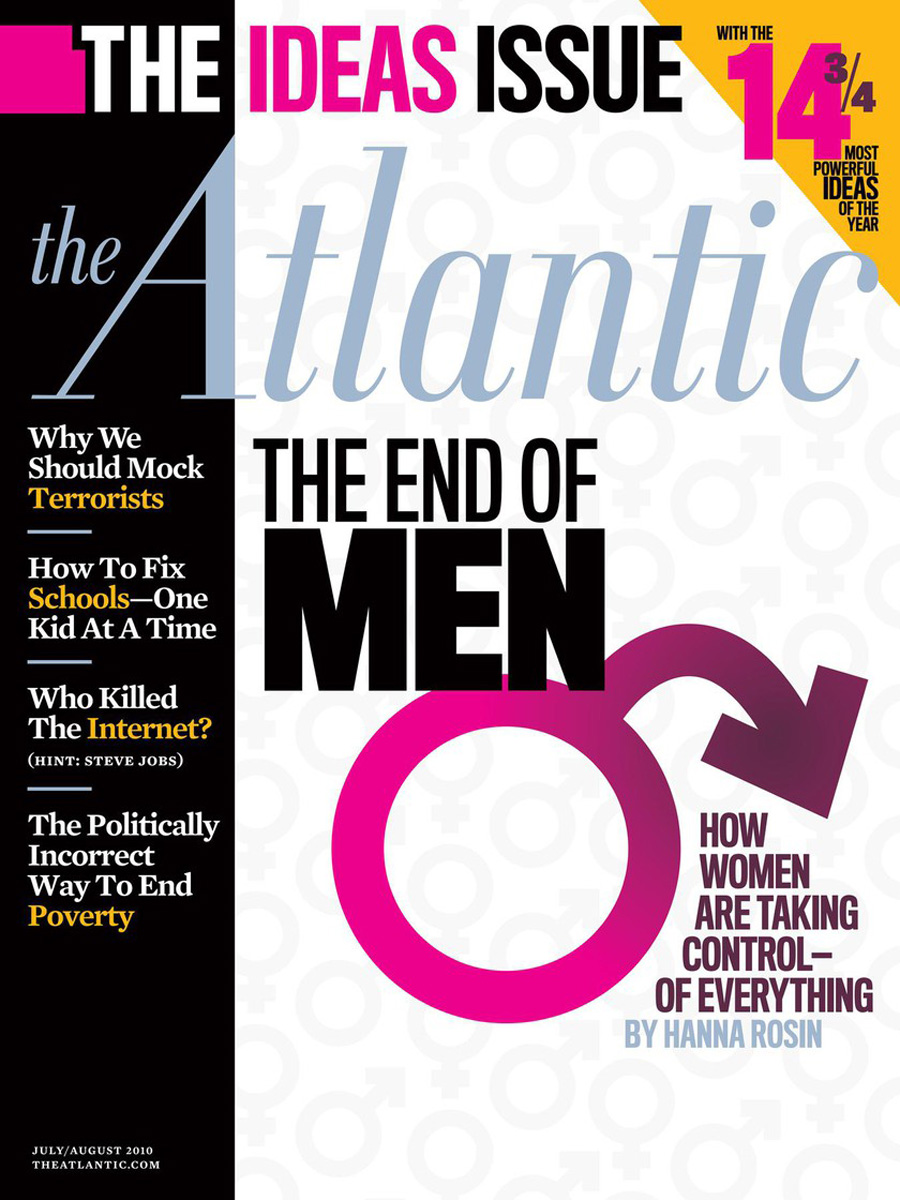 Index
Index 
Appearance and Reality Human Rights (Gender) Morality Souls
My comment based on the article below and other things: What if Hanna Rosin has it the other way around? What if it's not the economy that is the cause of women's "equality" and rise, but rather the effect of women's morality? An effect of the shift to "only if I say it's OK" legal systems, and its attendant rise of female power, is, hence, imposition of the "caring, nurturing" society, emphasis on morality, community, family, always seeking ever more protection for them, especially for children"; This demands that drive men's acquiescences for sex to women's. So we men bring more trinkets and swords to impress the little ladies. Perhaps the economy of "more" is a result of women's morality, not a liberator of the human potential "of the other half". One's liberation is another's enslavement. Are we all better off? Does "we" include frogs? | |
 |
Following is a long quote from: The End of Men by Hanna Rosin, in "The Sexes" section, July/August 2010 Atlantic Magazine, accessed at http://www.theatlantic.com/magazine/archive |
What if the modern, postindustrial economy is simply more congenial to women than to men? For a long time, evolutionary psychologists have claimed that we are all imprinted with adaptive imperatives from a distant past: men are faster and stronger and hardwired to fight for scarce resources, and that shows up now as a drive to win on Wall Street; women are programmed to find good providers and to care for their offspring, and that is manifested in more- nurturing and more-flexible behavior, ordaining them to domesticity. This kind of thinking frames our sense of the natural order. But what if men and women were fulfilling not biological imperatives but social roles, based on what was more efficient throughout a long era of human history? What if that era has now come to an end? More to the point, what if the economics of the new era are better suited to women. Even more unsettling for Ericsson, it has become clear that in choosing the sex of the next generation, he is no longer the boss. “It’s the women who are driving all the decisions,” he says—a change the MicroSoft spokespeople I met with also mentioned. At first, Ericsson says, women who called his clinics would apologize and shyly explain that they already had two boys. “Now they just call and [say] outright, ‘I want a girl.’ These mothers look at their lives and think their daughters will have a bright future their mother and grandmother didn’t have, brighter than their sons, even, so why wouldn’t you choose a girl?” Why wouldn’t you choose a girl? That such a statement should be so casually uttered by an old cowboy like Ericsson—or by anyone, for that matter—is monumental. For nearly as long as civilization has existed, patriarchy—enforced through the rights of the firstborn son—has been the organizing principle, with few exceptions. Men in ancient Greece tied off their left testicle in an effort to produce male heirs; women have killed themselves (or been killed) for failing to bear sons. In her iconic 1949 book, TheSecond Sex, the French feminist Simone de Beauvoir suggested that women so detested their own “feminine condition” that they regarded their newborn daughters with irritation and disgust. Now the centuries-old preference for sons is eroding—or even reversing. “Women of our generation want daughters precisely because we like who we are,” breezes one woman in Cookie magazine. Even Ericsson, the stubborn old goat, can sigh and mark the passing of an era. “Did male dominance exist? Of course it e xisted. But it seems to be gone now. And the era of the firstborn son is totally gone.” Ericsson’s extended family is as good an illustration of the rapidly shifting landscape as any other. His 26-year-old granddaughter—“tall, slender, brighter than hell, with a take-no-prisoners personality”—is a biochemist and works on genetic sequencing. His niece studied civil engineering at the University of Southern California. His grandsons, he says, are bright and handsome, but in school “their eyes glaze over. I have to tell ’em: ‘Just don’t screw up and crash your pickup truck and get some girl pregnant and ruin your life.’” Recently Ericsson joked with the old boys at his elementary-school reunion that he was going to have a sex-change operation. “Women live longer than men. They do better in this economy. More of ’em graduate from college. They go into space and do everything men do, and sometimes they do it a whole lot better. I mean, hell, get out of the way—these females are going to leave us males in the dust.” Man has been the dominant sex since, well, the dawn of mankind. But for the first time in human history, that is changing—and with shocking speed. Cultural and economic changes always reinforce each other. And the global economy is evolving in a way that is eroding the historical preference for male children, worldwide. As recently as 1985, about half of all women in a national survey said they “must have a son.” That percentage fell slowly until 1991 and then plummeted to just over 15 percent by 2003. Male preference in South Korea “is over,” says Monica Das Gupta, a demographer and Asia expert at the World Bank. “It happened so fast. It’s hard to believe it, but it is.” The same shift is now beginning in other rapidly industrializing countries such as India and China. Up to a point, the reasons behind this shift are obvious. As thinking and communicating have come to eclipse physical strength and stamina as the keys to economic success, those societies that take advantage of the talents of all their adults, not just half of them, have pulled away from the rest. And because geopolitics and global culture are, ultimately, Darwinian, other societies either follow suit or end up marginalized. In 2006, the Organization for Economic Cooperation and Development devised the Gender, Institutions and Development Da tabase, which measures the economic and political power of women in 162 countries. With few exceptions, the greater the power of women, the greater the country’s economic success. Aid agencies have started to recognize this relationship and have pushed to institute political quotas in about 100 countries, essentially forcing women into power in an effort to improve those countries’ fortunes. In some war-torn states, women are stepping in as a sort of maternal rescue team. Liberia’s president, Ellen Johnson Sirleaf, portrayed her country as a sick child in need of her care during her campaign five years ago. Postgenocide Rwanda elected to heal itself by becoming the first country with a majority of women in parliament. In feminist circles, these social, political, and economic changes are always cast as a slow, arduous form of catch-up in a continuing struggle for female equality. But in the U.S., the world’s most advanced economy, something much more remarkable seems to be happening. American parents are beginning to choose to have girls over boys. As they imagine the pride of watching a child grow and develop and succeed as an adult, it is more often a girl that they see in their mind’s eye. | |